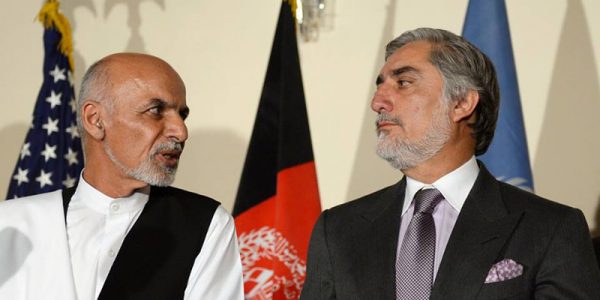A draft agreement between President Ghani and Abdullah Abdullah leaked by TOLOnews, show that the two Afghan leaders have reached a political settlement – an end to months-long dispute over the 2019 presidential election results.
Based on the agreement, the High Council of Government and the High Council of National Reconciliation will be established and half of the cabinet members will be introduced by Abdullah’s electoral ticket.
The High Council of Government, formed of political leaders and national figures, is aimed at creating political consensus and will provide consultation to the president on important issues. Members of the council is privileged with special government protocol and security services.
With an official protocol, Abdullah will lead the High Council of National Reconciliation. This council have five deputies, including the two deputies of Abdullah’s electoral ticket. The remaining three deputies will be introduced in consultation with the president. The council’s structure, however, will be formed by Abdullah in consultation with the president, political leaders, speakers of the senate and parliament, the civil society and elites of the country.
Abdullah’s authorities
As the draft agreement stipulates, Abdullah will lead the peace process, meetings of the High Council of National Reconciliation, appoint officials and administrative employees of the council, including those of the State Ministry for Peace Affairs – the ministry will server a secretariat of the council. However, introduction of half of the cabinet members is not specified as Abdullah’s own authority.
Based on the agreement, decisions and approvals of the High Council of National Reconciliation are bound to a majority vote of the council members. Once made, decisions and approvals are final and are bound to be implemented in line with the Constitution.
The agreement stipulates that the negotiation team will do its job based on instruction of the council’s leadership committee and will report to Abdullah. If required, the President can invite consultative meeting of the council.
In addition to peace affairs, the council is also assigned to attract international assistance for post-peace reconstruction efforts in Afghanistan.
As per the agreement, head of the council is provided with the security measures and formalities of the second highest official after President (like first vice president) and his deputies and senior adviser are also provided government formalities and security measures.
The high council’s budget
The council will be funded by Afghan government and at the same time it is authorized to receive budgetary support from international sources. The spending is not, however, exempted from assessment.
The high council’s structure
The High Council of National Reconciliation is formed of a general assembly and a leadership committee. Political leaders and national figures will form the leadership committee and a President’s representative will also attend the committee’s meetings as a member. The negotiation team and the State Ministry for Peace Affairs are also included in the council’s structure. Its structure, however, can be expanded by the President, if need.
The agreement further stipulates that all former chairs the High Peace Council will be consulted.
Participation in the government
A key part of the agreement is participation in the government in which Gen. Abdul Rashid Dostum will be given honorary title of marshal, the highest military rank. Dostum will be given membership of the High Council of Government and the National Security Council. Each side of the agreement will introduce 50 percent of the cabinet including key ministers. Governors are appointed according to a rule agreed by the two sides. Appointments and removals are made based on justifiable reason in consultation with the introducer.
Reforms
For reforms, the two sides have agreed to facilitate elections of provincial councils and district councils. A delegation will be assigned to amend the constitution following the district councils’ elections. Electoral reforms will be made at its earliest time. The law on political parties will be amended in accordance with the electoral reforms and new institutions and local government structure – perhaps new provinces or districts – will be established.
How the agreement is implemented?
The agreement will be implemented and monitored by a five-member intermediary and monitoring delegation who are authorized to stop any violation. Representatives of the United Nations will attend the signing ceremony of the agreement as observers.
The intermediary delegation has the highest authority to make a decision in case the agreement is violated by any party.




